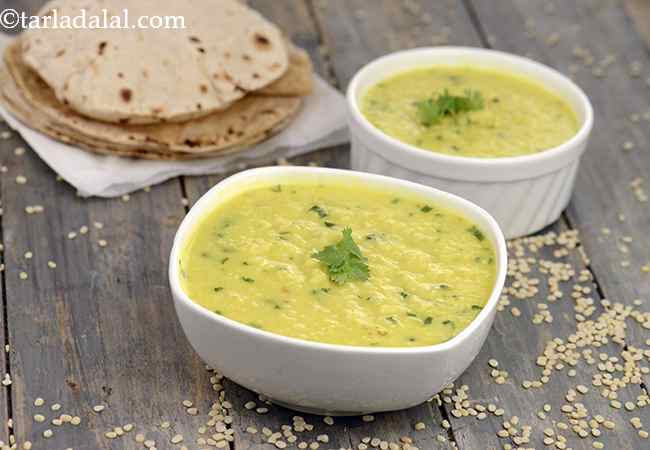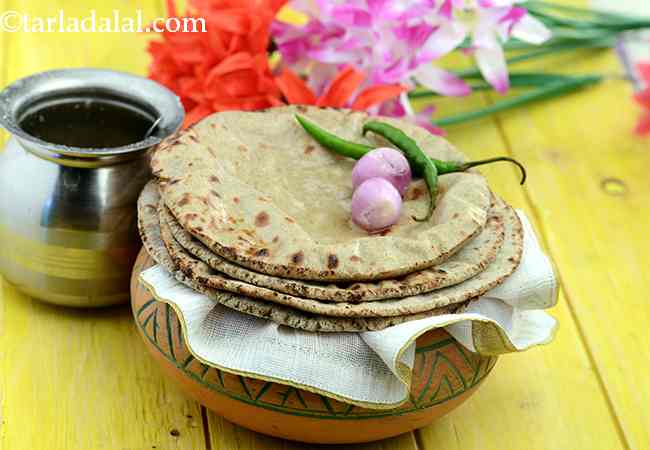293 calories for 1 serving of Gujarati Dal (Gujarati Recipe), Cholesterol 0 mg, Carbohydrates 38.6g, Protein 11.1g, Fat 10.7g.
Click here to view. gujarati dal recipe. Gujarati toovar dal | Gujarati tuvar dal | with 19 amazing images.
With a characteristic sweet and sour taste, this traditional Gujarati dal recipe is quite reflective of Gujarati culture and uses the typical ingredients and spices.
While Gujarati toovar dal is an everyday dal, it takes on a festive hue when ingredients like peanuts and yam are added to toor dal. For such grand occasions, the Gujarati tuvar dal is boiled over and over again to get the best flavour.
Remember that the ideal balance of sweet and sour levels required for the success of this Gujarati dalrecipe is an art that can be perfected with practice.
Notes on Gujarati dal recipe. 1. If you prefer a thinner consistency dal then add water accordingly. 2. Add the jaggery, mix well and simmer for 10 to 12 minutes, while stirring occasionally. It provides the necessary sweetness to the Gujarati dal. Also, you can add kharek which also provides a pleasant sweetness.
Is Gujarati Dal healthy?
Yes, this is healthy. But restrictions apply to some.
Let's understand the Ingredients.
What's good.
1. Toor Dal (tuvar dal, arhar dal, toovar dal) : Toor dal is rich in proteins, the building block of good health. High in fiber, diabetic and heart friendly. Being an excellent source of folic acid, pregnant women must include toor dal in their daily diet. Being an excellent source of fibre it helps in preventing and relieving gastric problems like constipation. See detailed benefits of toor dal.
2. Ghee : Other than calories and fats, the only nutrients that ghee is rich in are the vitamins – all of which are fat-soluble. All the 3 vitamins (Vitamin A, Vitamin E and Vitamin K) are antioxidants which have a role in removing free radicals from the body and protecting our cell as well as help in maintaining skin health and glow. Ghee is an excellent, high-quality selection medium of cooking because of its high smoke point. As compared to most oils and butter, ghee can handle a smoke point of 230°C, 450°F, thus its less prone to oxidant and destruction of nutrients. Yes, ghee does contain cholesterol, but some amount of cholesterol is needed by the body. Cholesterol has some functions to play too. It is necessary for hormone production, brain function, cell health and lubricating the joints. It is, in reality, a high quality fat for the body and brain. Ghee is loaded with fats but that’s medium chain fatty acids (MCT) which aid in weight loss. Ghee is healthy for daibetics in small amounts and you need to check your fat intake at the same time. Learn to easily make your ghee at home which is free of preservatives. See benefits of ghee.
3. Tomatoes : Tomatoes are extremely rich source of Lycopene. Tomatoes are a powerful antioxidant, super rich in Vitamin C, good for heart. Tomatoes are a Pregnant women's friend and are rich in Folate or Folic Acid which helps your body to produce and maintain new cells, especially red blood cells. Read about 13 amazing benefits of tomatoes.
4. Coriander (kothmir, dhania) : Coriander is a fresh herb often used as a flavour enhancer in Indian cooking. It is mainly used as a garnish. This is the best way to use it - no cooking. This preserves its vitamin C content which helps to build our immunity and bring that sparkle to the skin. The antioxidants vitamin A, vitamin C and the quercetin present in coriander works towards strengthening our immune system. Coriander is a fairly good source of iron and folate – the 2 nutrient which help in the production and maintenance of red blood cells in our blood. Good for reducing cholesterol and good for diabetics. Read 9 benefits of coriander to understand details.
What's the problem?
1. Kand (Purple Yam, Suran) : The antioxidant anthocyanin is the key element which will help fight the free radicals produced due to stress and pollution. Again it’s the anthocyanin which is identified as an anti-cancer agent. It helps in the prevention of cancerous cells. Purple yam is fairly good source of carb, almost equal to potatoes, it would be best for diabetics to restrict its use. Fiber will bind cholesterol, while potassium will balance the effect of sodium and ease the nerves. However, kand also lends some carbs with it. So if you are overweight or diabetic along with exhibiting heart trouble, try and restrict its consumption. Read details is kand healthy?
2. Jaggery (Gur) : When compared to sugar, which provides only empty calories, jaggery is considered to be a superior natural sweetener. Sugar is definitely one of the causes of many chronic diseases, but jaggery too needs to be consumed in moderate amounts. What you would consume is just about a tbsp (18 g) or a tsp (6 g). While those with heart diseases and weight loss can have a dessert made with this quantity of jaggery occasionally as an option to refined sugar, but diabetics need to avoid this sweetener too as it can spike blood sugar levels instantly. Read is jaggery healthy for complete details.
Note : 1 cup = 200 ml (standard cup available in the market). The weight in grams varies for each ingredient.
Can diabetics, heart patients and over weight individuals have Gujarati Dal ?
Yes, this recipe is good for diabetics, heart and weight loss BUT drop the kand from the recipe as its optional. Kand lends some carbs with it. So if you are overweight or diabetic along with exhibiting heart trouble, try and restrict its consumption. So you may have the kadhi if you cut the usage of Kand by half or even more. Also cut the jaggery from the recipe.
What are healthier dal options?
Try super healthy dal recipes like palak toovar dal, khatta urad dal recipe, suva masoor dal recipe, hariyali dal recipe and healthy kadhi recipe or Radish Koftas in Kadhi recipe.

Khatta Urad Dal ( Zero Oil Urad Dal Recipe)
Always combine dal with rotis.
Combine dal with bajra roti, jowar roti, radish nachni roti recipe , basic ragi roti recipe, and whole wheat roti, whole wheat bhakri recipe to make a healthy combination. Note that when you combine any dal with any cereal like bajra, jowar, ragi, buckwheat, barley or whole wheat to enhance the protein value.

Bajra Roti
Can healthy individuals have Gujarati Dal?
Yes. Drop the kand if you wish as it's high in carbs.
8 Pointers to get healthy on a Indian diet
1. Eat healthy and say yes to good home cooked food. Prefer whole grains like oatmeal, quinoa, buckwheat, barley and healthy flours like bajra flour, jowar flour, quinoa flour, wheat flour etc. rather than refined ones like maida. Have healthy Indian fats like ghee, coconut, coconut oil in your diet.
2. Opt out of junk food, packaged food, deep fried foods. Prefer steamed snacks and other non-fried snacks. Check out some Healthy Indian Snacks. Remember to eat small frequent meals through the day as that will keep you always full and prevent your blood sugar from dropping. By starving your body through some diet, will not help you one bit. In fact, dieting will make you binge on 2 to 3 meals which is not good.
3. Have 4 to 5 servings of vegetables and 2 to 3 servings of fruit is a must. Follow the logic of a vegetable in each main meal of the day and a fruit in-between meals. Check out a few Healthy Indian Soups and Healthy Indian Salads recipes using this food group.
4. Cut down on sugar and salt in your diet and pick honey ( very small amounts) or dates to sweeten your food. Slowly cut the sugar habit as this is not going to happen over night. Sugar is also called white poison. It is a simple carbohydrate with zero nutritional value. On intake, sugar will cause inflammation of the body which will last for many hours. It will spike your blood sugar level and shut down the fat burning process. This also causes high blood sugar levels in your body. The development of prediabetes comes from uncontrolled eating sugar and refined food products for many years and the classic symptom is if you have excess belly fat. This leads to diabetes and further onwards to heart attack, high blood pressure, strokes, impotence and kidney damage.
Salt and blood pressure. Apart from stress and obesity, one of the main reasons for high blood pressure is excessive sodium and salt intake. Most people find it difficult to limit the amount of salt in their cooking, thinking it will affect the taste of their favourite dishes.
This is not true. Bajra and jowar are rich in potassium and critical for those with High Blood Pressure as it lessens the impact of sodium. Eating more Potassium Rich Foods will remove more sodium from your body through urine. So include the basic bajra roti and jowar roti in your daily diet to have with Lower Blood Pressure Subzis Recipes.
5. Befriend a few healthy seeds and nuts like chia seeds, flax seeds, sesame seeds, walnuts and almonds.
6. Sprouts are called ‘living food’. They are high is most nutrients and easy to digest as well. Let them feature in your meals at least thrice a week. Also Read : All Benefits about Sprouts.
7. Exercise 45 minutes every day. No excuse. You can walk fast, run, do weights, play your favourite sport or go to the gym.
8. Sleep early and get up early. Get your body into rhythm and it will function best. Sleep helps your body to recover.
Gujarati Dal is high in
1. Protein : Protein is required for the managing the wear and tear of all cells of the body.
2. Folic Acid : Folic acid is an essential vitamin required throughout pregnancy.
3. Phosphorous : Phosphorous works closely with calcium to build bones.
4. Vitamin B1 : Vitamin B1 protects nerves, helps in carbohydrate metabolism, prevents heart diseases and helps produce red blood cells.
Note : a recipe is deemed high in a Vitamin or mineral if it meets 20% and above the recommended daily allowance based on a 2,000 calorie diet.
How to burn 293 calories that come from one serving of Gujarati Dal?
Walking (6 kmph) = 1 hr 29 mins
Running (11 kmph) = 30 mins
Cycling (30 kmph) = 39 mins
Swimming (2 kmph) = 51 mins
Note: These values are approximate and calorie burning differs in each individual.